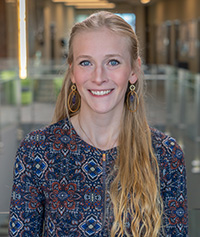2023 Young Alumni Achievement Award

Elizabeth G. Sgambelluri ’13
The Young Alumni Achievement Award is presented to an alumna or alumnus who has achieved exceptional success in his or her profession and who has graduated within the past two to ten years.
She is often described as a Renaissance woman. With six degrees, four publications, a patent, and a medical license, the sky is the limit for Elizabeth G. Sgambelluri ’13. The incredible work she is doing linking her passion fields of wildlife and human health, in the United States and around the world, will influence generations.
For as long as she can remember, Lizzy has refused to package the wants of her heart and mind into one small box. Fascinated by the concept of health from a very young age, monitoring the behavioral patterns of deer populations in her backyard, and motivated by her mother, a renowned physician, she says she has always had an “insatiable thirst for learning.”
Lizzy received her bachelor's degree in environmental science from Moravian in 2013. From there she completed two master’s degrees simultaneously—one in biodiversity, wildlife, and ecosystem health at the University of Edinburgh in Scotland; the other in environmental studies at Antioch University New England in New Hampshire. She graduated with high honors. “I am an ‘I get stressed if I don’t have something to stress about’ kind of gal,” Lizzy admits. “So obviously pursuing just one master’s degree was not enough.”
Lizzy completed her thesis research on noninvasive strategies for monitoring stress-reduced immunosuppression in African lions. She realized there were no viable methods to effectively monitor stress and health in large felines, so she devised and patented the first-ever device to collect their saliva noninvasively. “Such opens a huge door in the potential for monitoring stress—as well as reproductive and immunologic health—in both captive and wild populations,” explains Lizzy.
During the time of her research, she also served as an adjunct professor at Keene State College in New Hampshire and taught courses ranging from genetics and cellular biology to ecology and evolution. Her multidisciplinary research allowed her to augment her lessons to better help her students in their career paths. Even when teaching upwards of 30+ students at a time, she says she always worked to elevate them to success.
“There is something to be said about illuminating, empowering, and instilling pieces of yourself and mind with those around you; especially if such enables the other party to build upon themselves and grow their knowledge base,” Lizzy says. “I think those lightbulb moments were just as exciting for me as the professor as they were for my students.”
Lizzy obtained her master of science in physician assistant studies from Pace University in New York City in 2021. She was a member of Phi Alpha honor society and graduated in the top three of her class. Nowadays, Lizzy marries her diverse knowledge across species through her work as a founding member of One Health Initiative, a collaborative, multidisciplinary field focused on recognizing the interconnection between humans, animals, and the environment.
“There is much we can learn about our own health from animal counterparts and much to learn about our role in the health of the world around us. Unfortunately, most individuals [studying these areas] practice solely within the constructs of wildlife, veterinary, and ecological health,” Lizzy says. “Lacking are individuals further excelling in human health. I could serve such a role, I realized. I could be that missing link.”
Lizzy currently practices medicine as a board-certified physician in both primary and urgent care at Medemerge Primary Care. She also just recently accepted a position as a clinical professor for the physician assistant program at Pace University-Lenox Hill Hospital, teaching new physicians navigating the same program from which she graduated. In her “spare” time, Lizzy serves as a consulting statistician as well as a grant reviewer for National Geographic, where she has the opportunity to help inquisitive minds at work.
“Slowly, we can create a world where we operate harmoniously within our environment, with surrounding species, with each other and—perhaps—better understand our place within a complex system of interconnections.”
